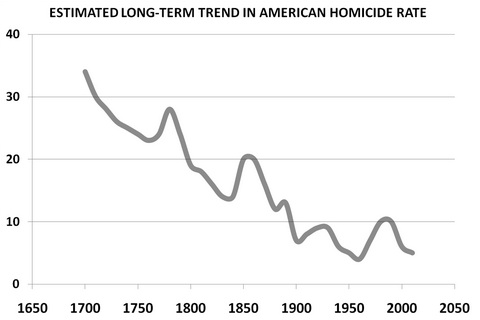One of my favorite books from 2012 was Steven Pinker’s “The Better Angels of our Nature: Why violence has declined.” His book has two parallel lines of discussion: 1) data showing the unappreciated and massive drop in violence over centuries, and 2) explanations as to why this drop happened. Let’s tie Pinker’s book to the gun control debate and see where it leads.
A typical chart from Pinker’s book is below, showing homicides per 100,000 from 1200 to 2000.
Here’s a similar chart, not from the book, showing homicide rates per 100,000 for the US from 1700-2000:
The first reaction most people have to these charts is to assume the data is wrong. After all, we live in violent times, or at least it seems to us. How Pinker got my head around these charts was by imaging the violence as happening in a “foreign country called the past.”
In the foreign country called the past, violence was a casual and constant companion. Crowds gathered to watch people get drawn and quartered as popular entertainment. This was real, commonplace, prevalent. Only when you get your head around the casualness of past violence do the charts make sense. We are just soft modern foreigners compared to our great great grandparents.
Now I think Pinker’s book gets a bit bogged down at 800 pages. And in fact when I read reviews I got the impression that not even all the reviewers slogged through the whole thing. With that said it’s a great book and I’m sympathetic to Pinker since he has to convincingly upend conventional wisdom on how the world is getting worse. So while I recommend the book, if you can’t see yourself reading 800 pages you can just watch (or say you watched) the TED talk, or read this short interview.
Now rather than spend more time on Pinker’s book, let’s apply Pinker’s historic frame to the current gun control debate. So I’ll take Pinker’s thesis of the decline of violence due to the civilizing influences modern culture and institutions as a given. As such, you can assume the decline in violence will continue, which makes it clear that guns will eventually be banned, barring a zombie apocalypse or some other civilization ending disaster. So it’s a matter of forecasting when, not if, guns will be banned.
So this meme mocking gun control advocates is completely on point:
Many liberals tend to argue that they don’t want to ban guns entirely, they just want to control the worst kinds of guns or restrict who can buy them. But this is either disingenuous or clueless. The gun ownership advocates have it right. Banning assault weapons won’t stop gun violence, since handguns dominate homicide killings. In the long run it’s going to be all or nothing. And Pinker shows us that for guns it’ll eventually be nothing.
A good analogy here is banning cigarettes. First they banned them in some public spaces. Then more public spaces. Eventually in bars themselves. At that point, social sanction kicked in, and in upper class circles at least smoking is perceived as a filthy habit. We’re a long way from the glamorized smoking of 1940’s movies. The only way to ban cigarettes long term was to make people ashamed of smoking them. Then the laws and norms reinforced each other.
Another (completely unfair but stay with me) analogy is between pro-gun and pro-slavery advocates. In the 1850’s pro-slavery advocates pointed out that if we made slavery illegal then eventually we’d go down the path to full racial equality and interracial marriage. Liberals at the time said that was nonsense, blacks will always be second class, we just want to end slavery itself. But like the pro-gun lobby, the pro-slavery lobby understood better than the liberals how it would all turn out. To be clear, it is entirely unfair to equate slavery to gun ownership, so I don’t want to claim that at all. Owning guns by itself is no moral wrong. It’s the wide availability of guns that is the problem. So what I did want to highlight was how people against a movement sometimes understand that movement’s long term consequences better than people arguing for “just one more small step.”
Where does that leave us? Well, if you want to argue for tighter gun control, I think you should come clean and just say you want to ban guns entirely. Like the anti-smoking movement, the goal is to ostracize and legislate bit by bit until guns are seen as a filthy habit. If you are a politician of course you can’t or won’t say that. After all, 40% of US households have guns. But as a regular citizen a complete ban is the only logical way to control gun violence, and as Pinker has shown it’s consistent with the deeper wheels of history. And if you want to keep guns legal, well, it might be best to accept the fact that all you can do is slow history down. Ideally you can at least understand that the long term decline of guns is a price we must pay for the long term decline of violence. And for better or worse, most our great great grandchildren will be horrified by the thought of owning a gun.






2 comments